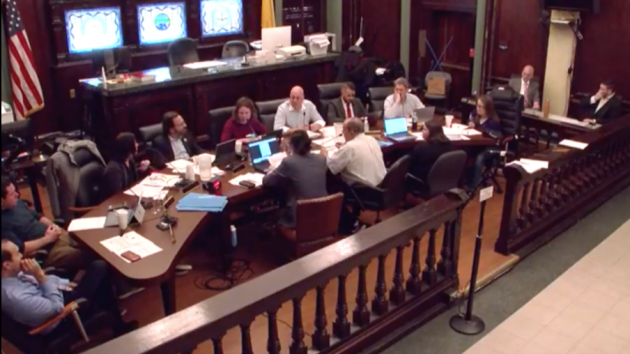The Hoboken City Council approved a controversial rent control ordinance on first reading last night, despite about a dozen people coming out against it.

By Daniel Ulloa/Hudson County View
“I’ve been involved in the rent control law over the years. I’m against any weakening of the rent control ordinance. This city is incredibly overpriced as it is. And now we’re going to attack affordable housing,” exclaimed Eric Volpe.
“Are you seriously going to vote on something where you just put up the version late yesterday afternoon? Our laws on the books are fairly protective. But no one would know given the way they have been administrated,” said Cheryl Fallick, of the Hoboken Fair Housing Association.
She added that a 400-square-foot basement apartment in town typically costs $4,000 a month in rent.
“The proposed changes in rent control law undermine tenant protections,” Dan Tumpson asserted.
He took particular umbrage with the fact that the base rental from 1985 will be used as a universal stating point, which distorts calculations of increases based on the Consumer Price Index (CPI).
“Landlords now have the right to impose rapidly increase rents which undermines the intent to limit rent increases. Please table these rent control amendments.”
Conversely, Steven Dunn said he was “ambivalent” about rent control, though acknowledged that dropping he annual maximum rental increase from 7.5 percent to 5 percent helps the cause.
“The idea that this council is on a jihad against rent control is absurd,” Dunn stated.
“I have a three-unit building. It’s under rent control. Because of rent control … I am subsidizing people who work on Wall Street who make more money than I do. We have redevelopment projects that sit around for 10 years,” noted Jim Vance.
Mile Square Taxpayers Association Executive Director Ron Simoncini, along with other landlords, also spoke out against the measure, as the organization did on Tuesday.
After about an hour of public comment, Council President Emily Jabbour asked Councilman-at-Large Jim Doyle, the prime sponsor of the local legislation, to address some questions, in particular regarding the last-minute changes.
“This was an effort to largely help clarify uncertainties and to get the rent board back on track so that people who needed help and protection from whatever the circumstances are would not have to wait. We’re currently having a backlog,” he said.
“The notion that this is weakening tenant protections I think is an unfortunate characterization: It was broke, it needs help. This is an effort in that regard. The rent control ordinance is really … about protecting the inventory of apartments, not just the existing tenant today.
He also acknowledged some of the frustration at the podium, but continued to defend the ordinance, noting that the CPI cap was increased from 4 percent to 5 percent.
6th Ward Councilwoman Jen Giattino remained thoroughly unconvinced.
“Today, I actually printed out the ordinance. The one online doesn’t have any strike-through. Or has very few strike-throughs. I’m not trusting the word of anyone on this council without reading it myself,” she said about the late revisions.
“With regard to the red line, there are eight amendments being made. Two of them are entirely new paragraphs,” Doyle replied.
2nd Ward Councilwoman Tiffanie Fisher argued the amendments were supposed to be underlined.
“Is that how the law works?” Doyle replied sarcastically. “I disagree. To the extent that a provision is dramatically, completely changed, to redline a paragraph of 30 words for four words changed … it is not uncommon to say this entire paragraph has changed.”
“This is not a Herculean read, this is not a 100-page document,” Doyle continued.
“The last time I voted on something without reading it myself,” Giattino began before getting cut off by Jabbour, which drew some rumblings from the crowd.
“Excuse me. My point was the comment had already been heard and I do not want this to devolve into a debate. This item is on for first reading. Councilman Doyle has provided his explanation for clarity. This is not going to turn into a back-and-forth. We are going to proceed,” Jabbour said.
Fisher sought to make a motion to carry.
“I think I already called for the vote,” Jabbour replied.
“That’s because you rushed into it … You knew I was going to make a motion to table. So you intentionally tried to stop me. You can do whatever you want. I’m just saying it out loud,” Fisher answered.
“Councilwoman Fisher, I will grant your motion to table,” Jabbour said.
“I motion to carry,” Fisher replied.
Jabbour indicated that there are two readings for ordinances for this very reason, so that a public hearing can take place twice, which doesn’t count the discussions the council has on the matter in subcommittee meetings.
“With all due respect, with one of the most important pieces of legislation, I would hope that we come together and have a piece of legislation all nine members can get behind, and we can have an active debate, notwithstanding you don’t want to have an active debate,” Fisher argued. “It’s a motion to carry.”
The motion to carry failed 6-3, with Fisher and Giattino voting for it.
The ordinance passed on first reading 6-3, with Fisher, Giattino, and 4th Ward Councilman Ruben Ramos voting no.









Ravi’s goons pushing their way around again and that guy Jabber has some serious nuts.
What’s better than rent control? A tax on vacant lots and unoccupied buildings. While rent control makes it less attractive to supply accommodation, a vacant-property tax makes it less attractive NOT to! Such a tax, although sometimes called a “vacancy tax”, is not limited to what real-estate agents call “vacancies” — that is, properties available for rent. It also applies to vacant lots and empty properties that are not on the rental market, and prompts the owners to get them habitable and occupied in order to avoid the tax.
Yes, a vacant-property tax is meant to be AVOIDED. It’s not meant to be paid. Better still, its avoidance would involve economic activity, expanding the bases of other taxes and allowing their rates to be reduced, so that everyone else—including tenants, home owners, and landlords with tenants—would pay LESS tax!
MORON
You’re confusing redevelopment zones pending approvals and businesses waiting for zoning sign offs.
Just because it looks empty doesnt mean its vacant
Stay in your town
Councilman Doyle has lost all credibility when in front of the City Council cameras said he knew about the loophole in the Hoboken cannabis zoning rules that would allow Mrs Fulop’s pot shop on 14th Street and remained silent. He did not tell the public or apparently his Council colleagues trying to block the shop.
When Doyle pontificates about rent control you have to understand his ethics are transactional.
So many of the rent control “advocates” are sub letting their apts or renting on Air BnB
Guess DeFusco taught them well
Go Paul!